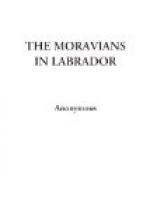Next year, 1813, brother Schreiber arrived to succeed the late lamented Burghardt as superintendant, and brought with him two efficient missionaries. The general course of the mission for some time continued pretty uniform, the meetings were always well attended, and so great was the desire of the people to be present, that some came at the hazard of their lives; especially the sisters, who, when they had no boat of their own, would venture across bays some miles in breadth, sitting behind their husbands on their narrow kaiaks. The number of printed books circulated in the congregations, and now constantly increasing, kept alive the desire to learn to read and understand the holy Scriptures. The schools were thronged by young and old.
It has sometimes been asserted that the sacred writings are ill adapted for school books; that they are above the capacity of children, and do not possess those attractions which little stories, extracts from entertaining writers, histories of our own and other countries present.[J] Without entering upon any argument, it may be sufficient to remark, that at no time did our native Scotland produce a more intelligent, acute, and moral race, than that generation which was educated in schools where the Bible and the Shorter Catechism were the chief, if not the sole, medium of their instruction. At the Moravian settlements the same effects flow from a similar mode of tuition, and the mind that has been early exercised in searching out the meaning of the Divine Oracles of truth, comes well prepared to estimate the realities of life, and form a true and correct judgment upon common topics and matters of daily occurrence: they have been taught that the present ought to be improved with a reference to the future, not only in spiritual but in temporal matters, and the natural consequence is, that the converted Esquimaux and their children become at once an intelligent and a provident race. So long as they continued heathen their intellect in general appeared incapable of comprehending any thing beyond the immediate and grosser cravings of nature, but now they understood and could converse upon more rational subjects; then no arguments could induce them, not even their own necessities, to build store houses, but now they willingly assisted the missionaries in erecting these buildings for public use, while in some of the settlements they erected new ones for themselves. Along with reading, the natives were taught writing and arithmetic, in which many of them made no inconsiderable




